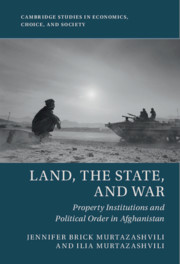Book contents
- Land, the State, and War
- Land, the State, and War
- Copyright page
- Dedication
- Contents
- Photographs and Drawings
- Maps
- Figures
- Tables
- Maps
- Acknowledgments
- Glossary
- Abbreviations
- Chronology of Events
- 1 Introduction
- 2 A Theory of Property Rights
- 3 Property Rights and State Building
- 4 Property Rights and War
- 5 Self-governance of Property Rights
- 6 Self-governance, War, and the Commons
- 7 Self-governance, Legal Titling, and the State
- 8 Are Property Rights a Cause or Consequence of Political Order?
- Appendix
- References
- Index
5 - Self-governance of Property Rights
Published online by Cambridge University Press: 20 August 2021
- Land, the State, and War
- Land, the State, and War
- Copyright page
- Dedication
- Contents
- Photographs and Drawings
- Maps
- Figures
- Tables
- Maps
- Acknowledgments
- Glossary
- Abbreviations
- Chronology of Events
- 1 Introduction
- 2 A Theory of Property Rights
- 3 Property Rights and State Building
- 4 Property Rights and War
- 5 Self-governance of Property Rights
- 6 Self-governance, War, and the Commons
- 7 Self-governance, Legal Titling, and the State
- 8 Are Property Rights a Cause or Consequence of Political Order?
- Appendix
- References
- Index
Summary
Our theory can explain why governments do not define and enforce property rights. The political history of Afghanistan illustrates the persistence of non-emergence of legal property rights. We also seek to explain why the Hobbesian account of the world in which there can be no sense of justice and no concept of property without a state is mistaken. According to our theory, self-governance would substitute for the state as a source of property rights when organizations have local monopolies, when they possess the capacity to resolve conflicts over land disputes, when their key decision makers face constraints, and when the institutions for local collective action are inclusive. Chapter 5 investigates this claim. Using original evidence from fieldwork, we show that self-governance of property works well in rural Afghanistan because customary governance satisfies the above criteria. Our theory can also explain why the formal property regime remains ineffective nearly two decades after state building commenced in 2001. Importantly, the property institutions in rural Afghanistan are typically private property rights, not unlike property rights in Western contexts. The difference is that customary private property rights in Afghanistan are effective despite not having any legal recognition.
Keywords
- Type
- Chapter
- Information
- Land, the State, and WarProperty Institutions and Political Order in Afghanistan, pp. 91 - 119Publisher: Cambridge University PressPrint publication year: 2021



